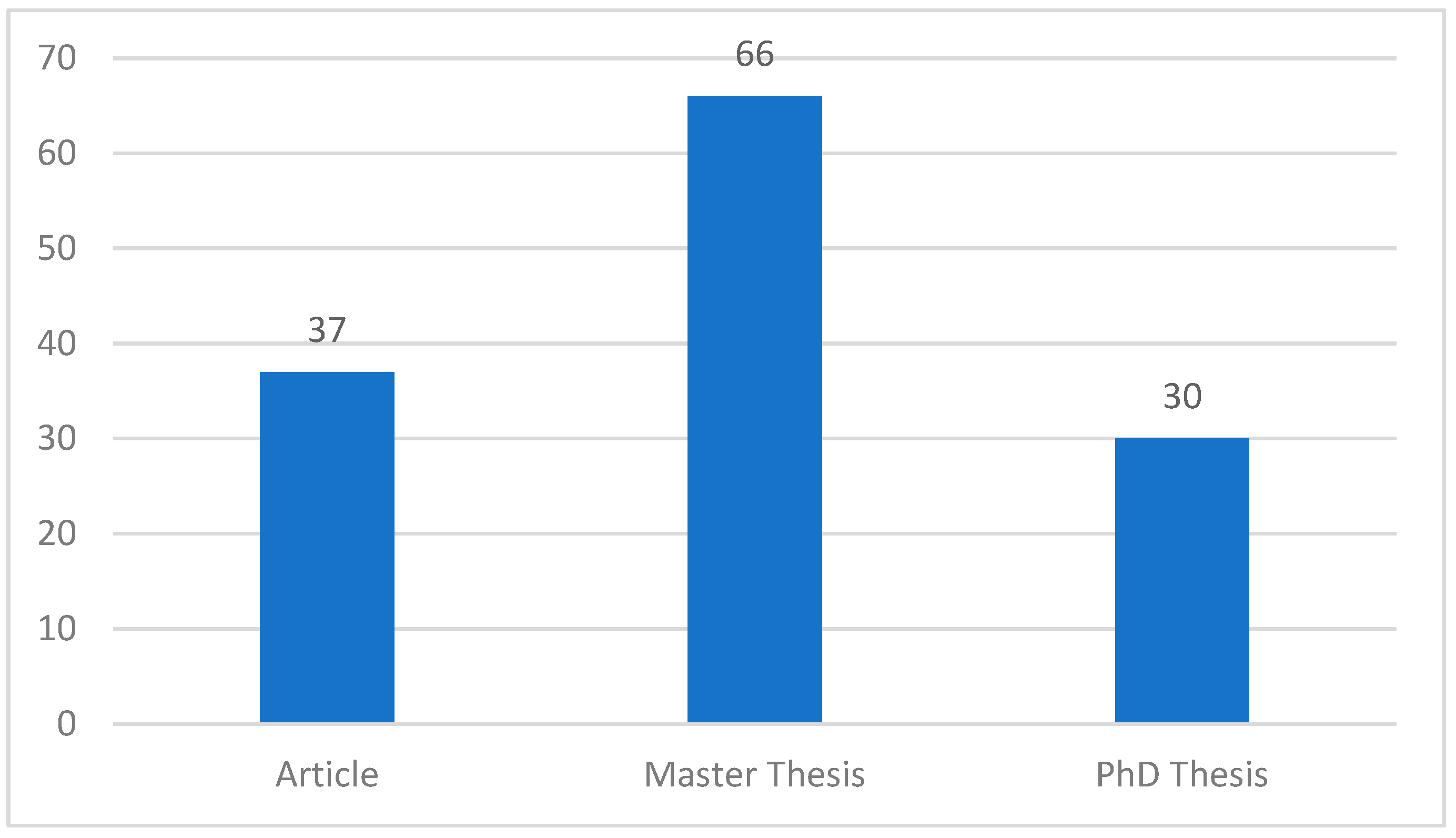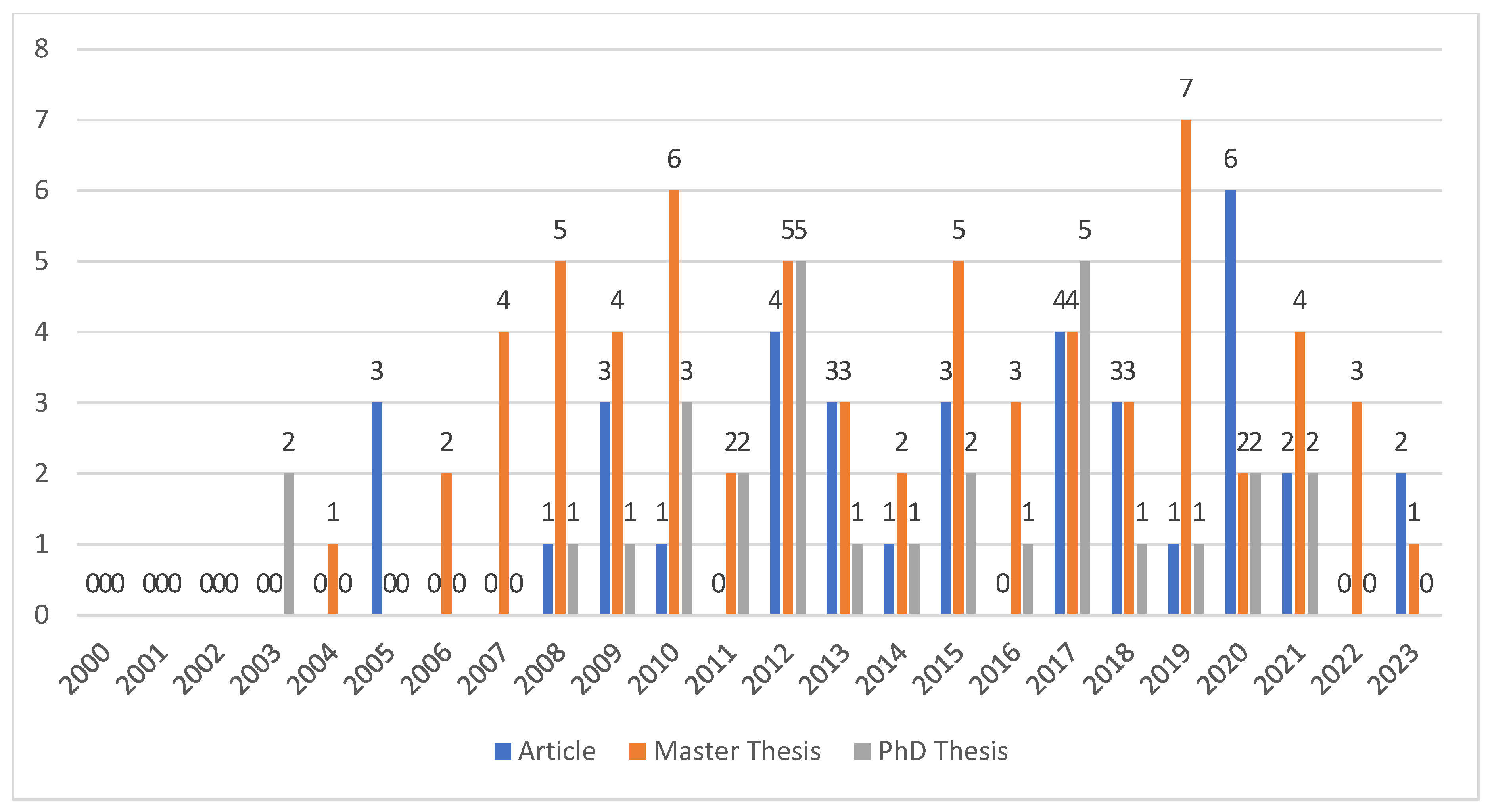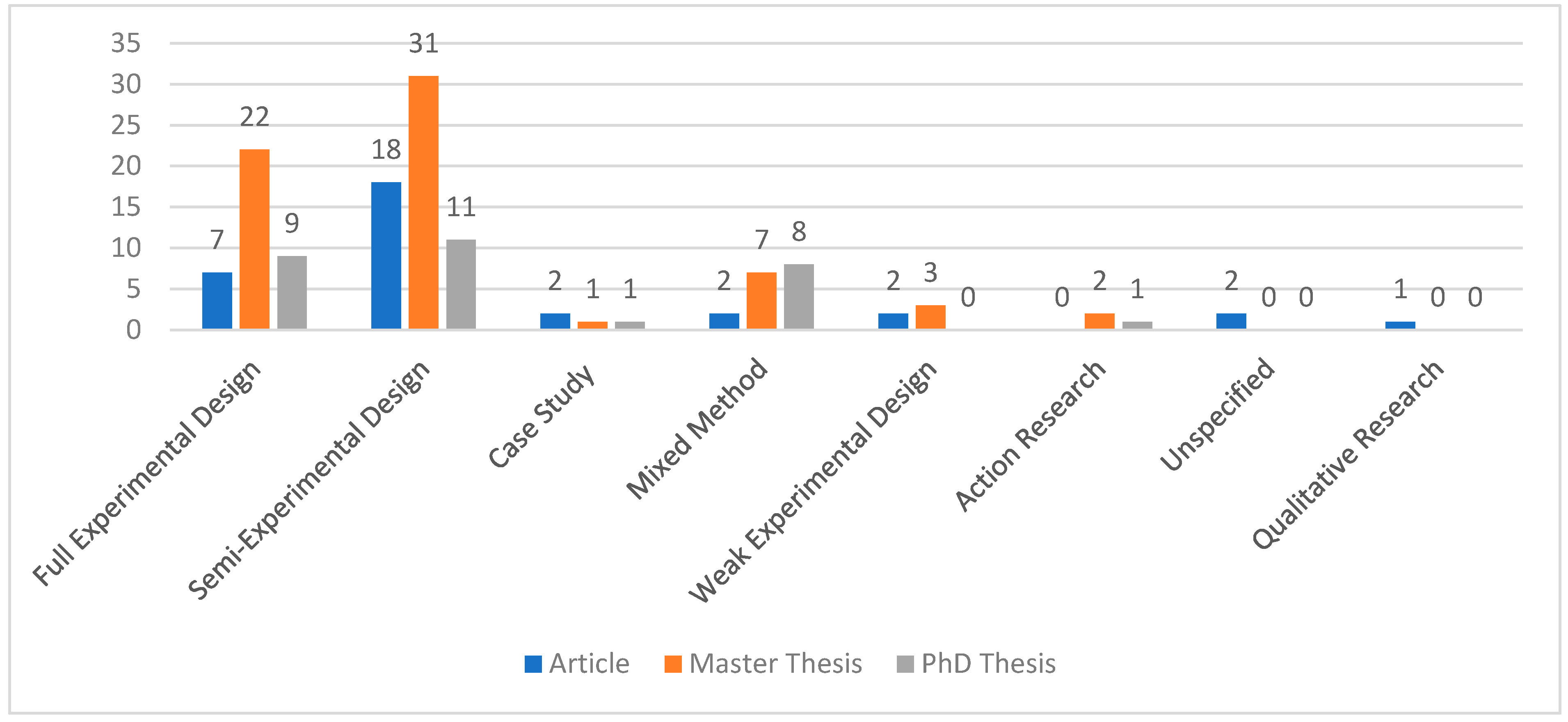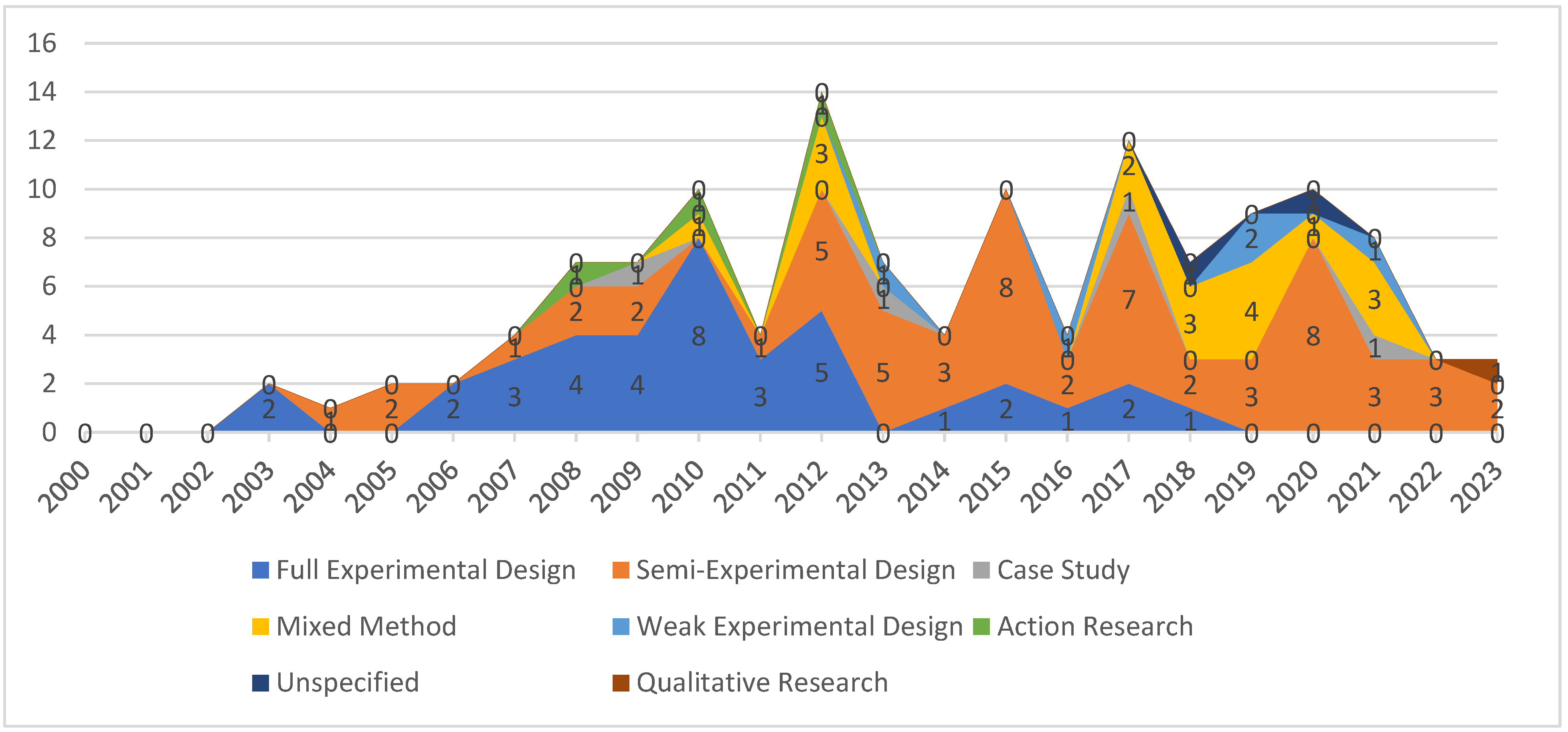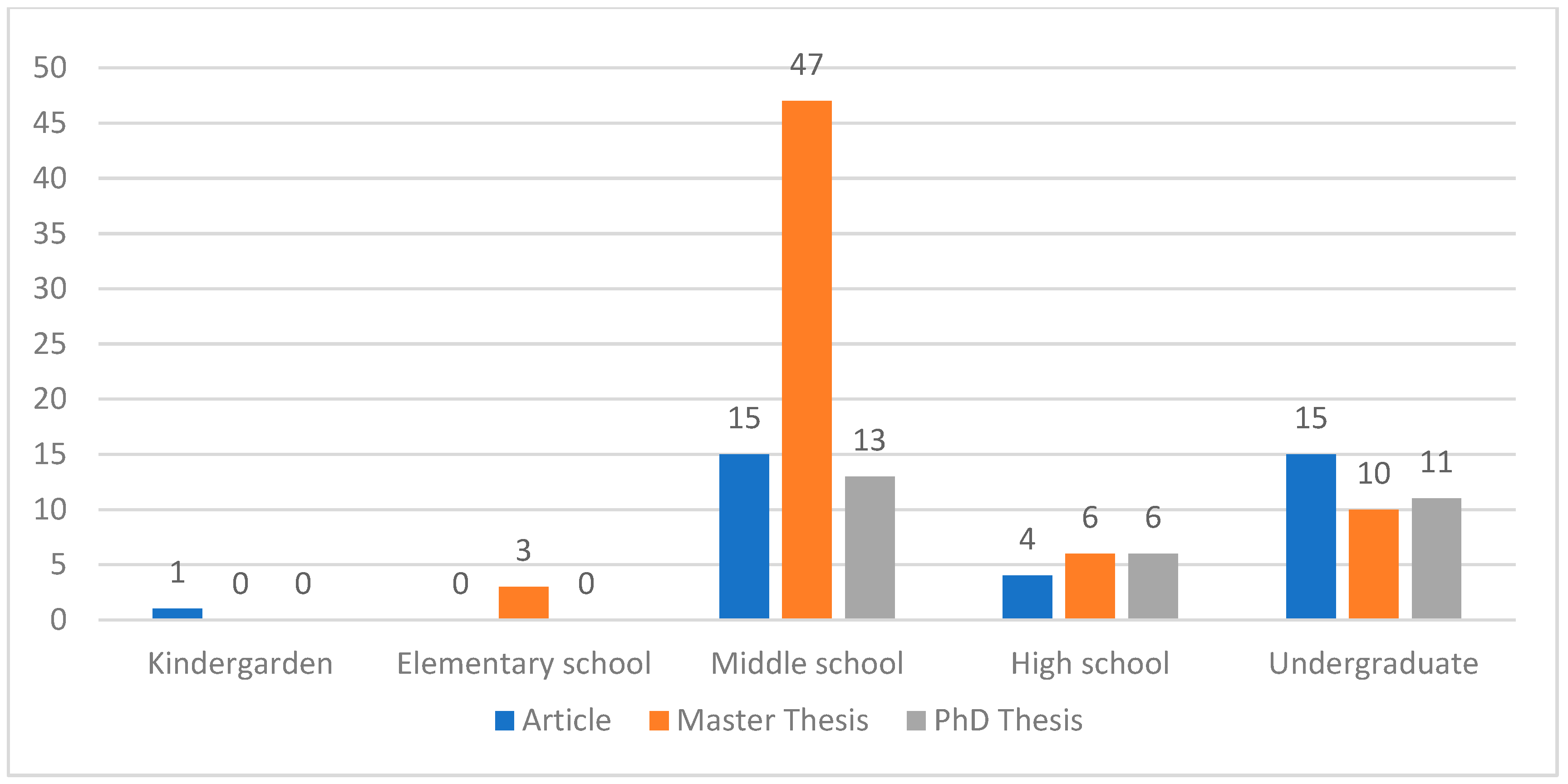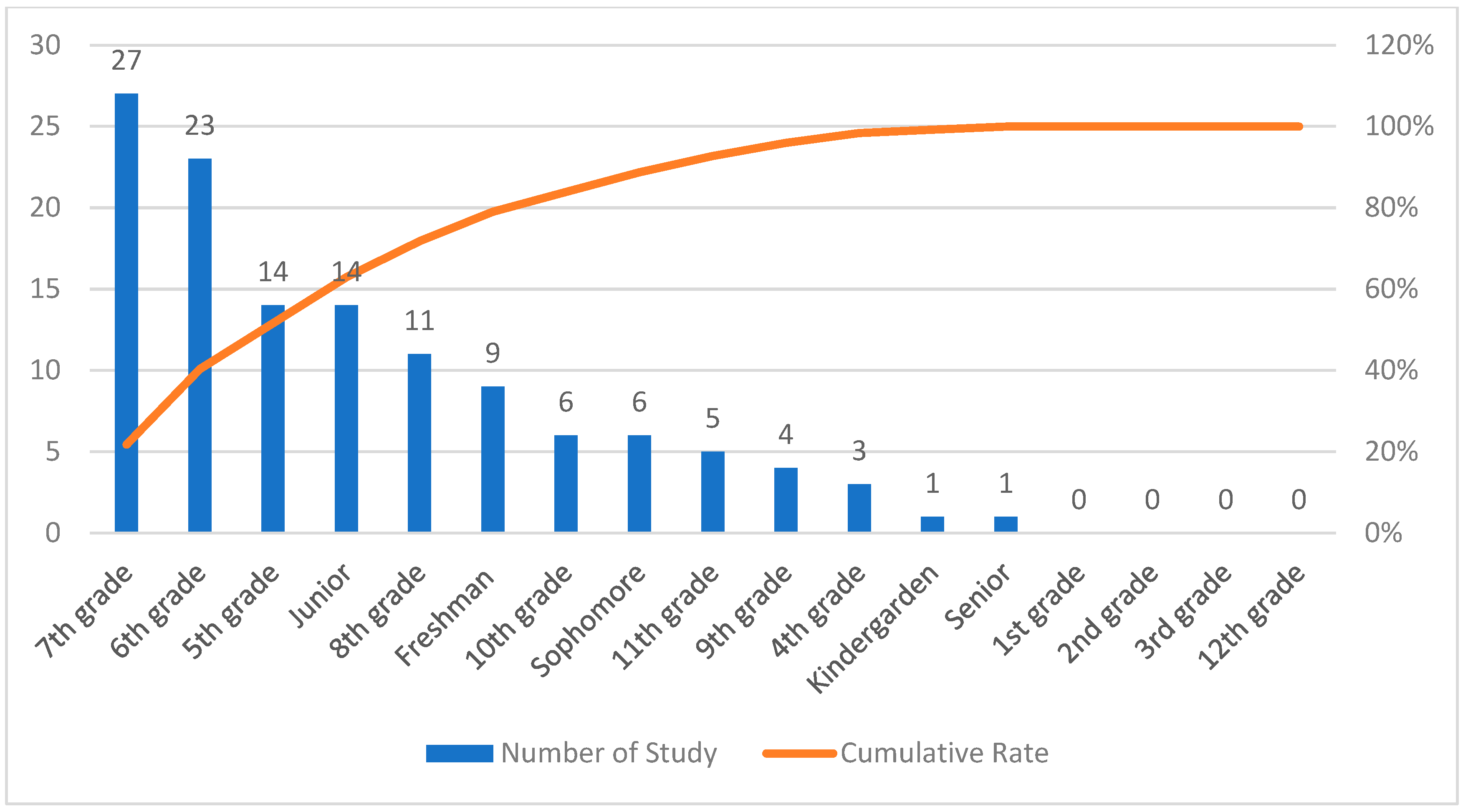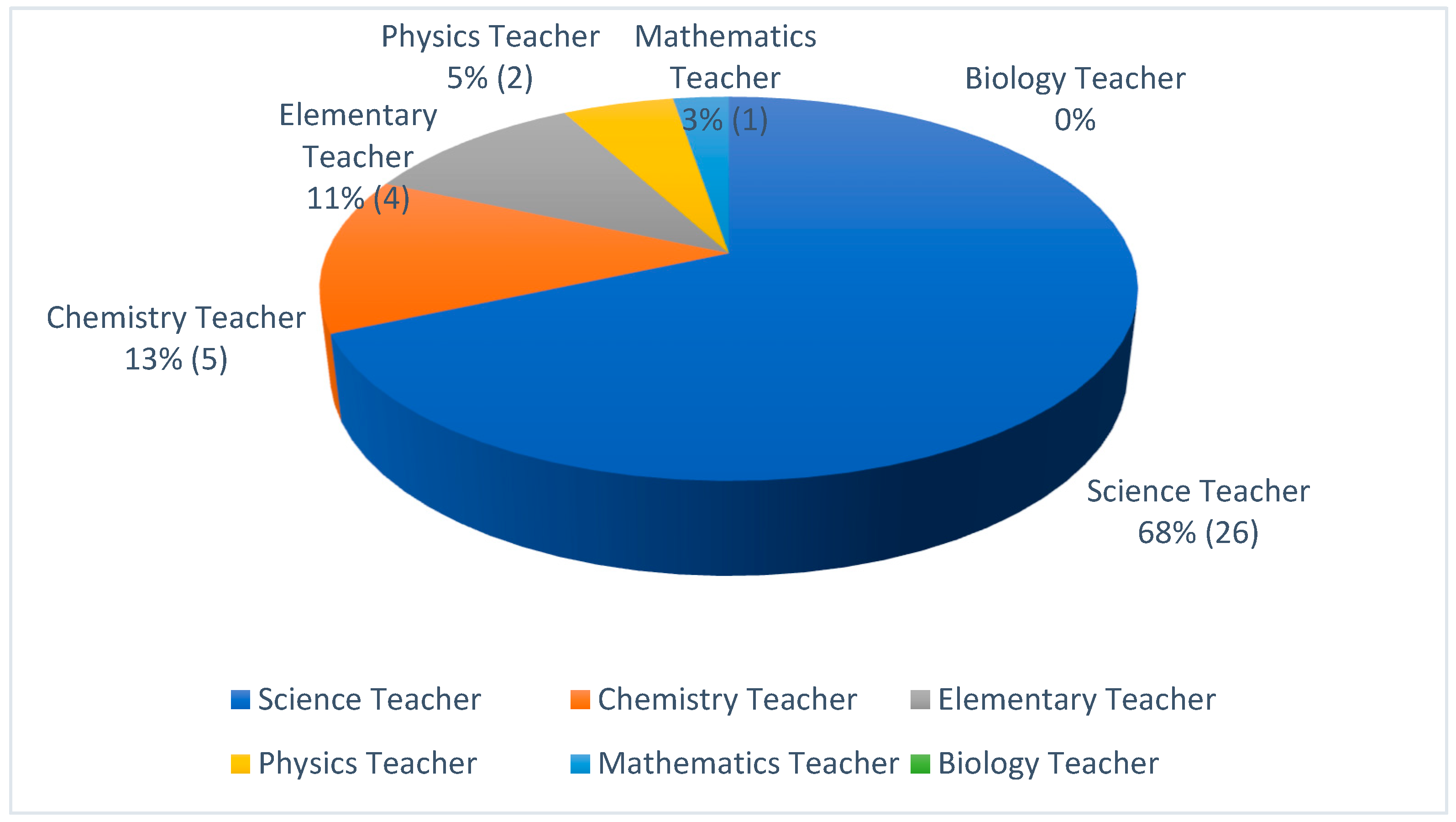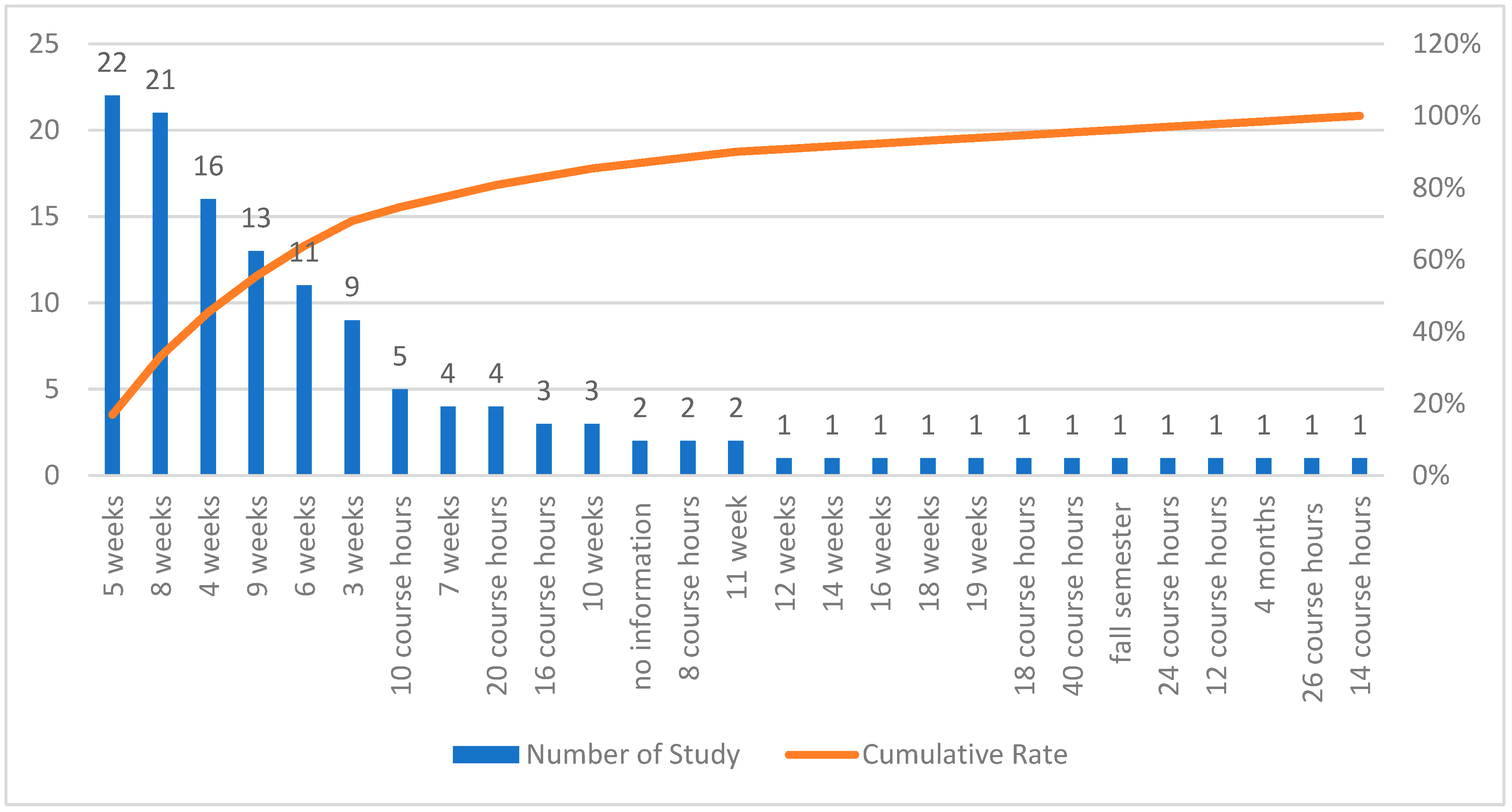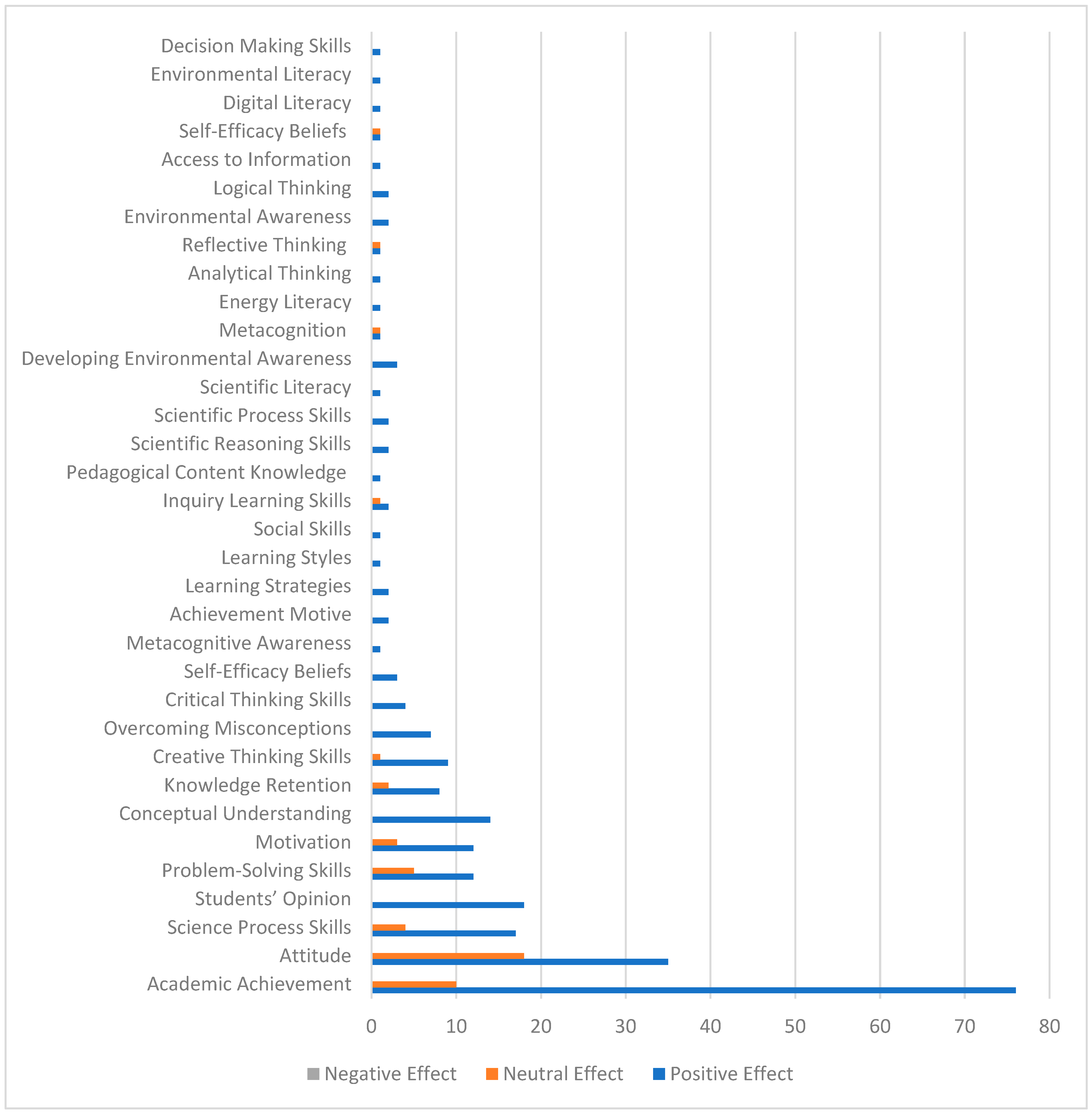Appendix A
Bibliographies of the studies in alphabetical order
Acikyildiz, M. (2004). Investigation of effectiveness of problem-based learning at physical chemistry laboratory experiments (Master’s Thesis). Atatürk University, Erzurum.
Akbulut, H.H. (2010). Implementation and evaluation of problem based learning on buoyant force and floating concepts (Master thesis). Karadeniz Technical University, Trabzon.
Akcay, B. (2009). Problem-based learning in science education. Journal of Turkish Science Education, 6(1), 28–38.
Akin, S. (2008). Teaching environmental problems caused by stubble fires, ozon layer depletion and vehicles through problem-based learning (Master thesis). Atatürk University, Erzurum.
Aksar B.G. (2022). The effect of the problem based learning method applied in distance education on the academic achievement, conceptual understanding and attitude of the environment on the human and environment unit (Master thesis). Marmara University, Istanbul.
Akti Aslan, S. (2019). The effect of virtual learning environments designed according to problem-based learning approach to students’ success, problem-solving skills, and motivations (Doctoral dissertation). Inonu University, Malatya.
Alici, M. (2018). Effect of STEM instruction on attitude career perception and career interest in a problem based learning environment and student opinions (Master thesis). Kırıkkale University, Kırıkkale.
Alper, Y.A. (2003). The Effect of cognitive flexibility on students achievement and attitudes in web mediated problem based learning (Doctoral dissertation). Ankara University, Ankara.
Altuncekic, A. (2010). The effect of web supported problem based learning medium upon cognitive and efffective learning products: Gazi University Kastamonu Education Example (Doctoral dissertation). Gazi University, Ankara.
Arici, F. (2021). Investigation of the effectiveness of problem based learning method of enhanced with augmented reality in the teaching of cell and divisions subject (Doctoral dissertation). Atatürk University, Erzurum.
Arslan Turan B. (2014). Effects of problem-based learning on achievement, self-regulated learning skills and academic self-concept (Doctoral dissertation). Hacettepe University, Ankara.
Arslan, A. (2009). The effect of learning style based on problem on the success of student in studying human and environment unit (Master thesis). Sakarya University, Sakarya.
Ayaz, G. (2007). The effect of problem-based learning on the elementary school students’ achievement in genetics (Master thesis). Middle East Technical Unıversity, Ankara.
Aydogdu, C. (2012). The effect of problem based learning strategy in electrolysis and battery subject teaching. Hacettepe University Journal of Education, 42(42), 48–59.
Aysu, G. (2019). An examination of the effects of problem-based learning STEM applications on students’ academic achievements and permanence of learning (Master thesis). Niğde Ömer Halisdemir University, Niğde.
Ayyildiz, Y. (2012). Development, application and evaluation of an active learning material based on constructivist approach in the subject of chemical reactions and energy in the high school chemistry (Doctoral dissertation). Dokuz Eylül University, Izmir.
Balim, A.G., Celiker, H.D., Turkoguz, S., Evrekli, E., & Ekici, D. İ. (2015). The effect of concept cartoons-assisted problem-based learning method on conceptual understanding levels and problem solving skill perceptions of students. Journal of Turkish Science Education, 12(4), 53–76.
Balim, S. (2016). The effects of using problem based learning method in science courses on talented students’ levels of academic achievements, inquiry learning skill perceptions and attitudes towards science (Master thesis). Dokuz Eylul University, Izmir.
Bayrak, B.K., & Bayram, H. (2012). The effect of problem-based learning in a web environment on the academic achievement of students with different learning styles. Mustafa Kemal University Journal of Social Sciences Institute, 9(18), 479–497.
Bayram, A. (2010). The effect of problem based learning on overcoming 5th grade students’ misconceptions about “heat and temperature” (Master thesis). Selcuk University, Konya
Bayram, F. (2023). The effect of problem based learning approach to teaching the unit of the solar system and eclipses on academic achievement and problem solving skills (Master thesis). Kocaeli University, Kocaeli.
Benli, E. (2010). The research of the effects of problem based learning to the permanence of information, the academic success of science teacher candidates and their attitudes toward science (Master thesis). Gazi University, Ankara.
Boncukcu, G. (2020). The effect of problem based learning model on environmental literacy, problem solving and self-regulatory skills of 8th grade students in sustainable development (Master thesis). Mersin University, Mersin.
Buyukdokumaci, H. (2012). Effects of problem based learning on learning products in science and technology lesson for elementary 8th grade (Master thesis). Pamukkale University, Denizli.
Can, I. (2021). Determining of the Effects Problem-Based Science Learning Activities on Gifted Students (Master thesis). Uşak University, Uşak.
Cayan, Y., & Karsli, F. (2015). The effects of the problem based teaching learning approach to overcome students’ misconceptions on physical and chemical change. Kastamonu Education Journal, 23(4), 1437–1452.
Celik, E. (2010). The effect of problem based learning approach in science education on students? academic achievement, attitude, academic risk taking level and retention of knowledge (Master thesis). Gazi University, Ankara.
Cakici, Y., Soyleyici, H., & Oguzhan Dincer, E. (2020). Investigation of the effect of problem based learning on the scientific process skills, attitudes and achievements of middle school students’: unit light. Trakya University Journal of Social Science, 22(1), 419–437.
Celik, E., Eroglu, B., & Selvi, M. (2012). The effect of problem based learning approach in science education on students’ academic achievement, and attitudes toward science and technology course. Kastamonu Education Journal, 20(1), 187–202.
Dadli, G. (2017). The effect of learning activities based on authentic problems in the human and environmental relations unit on the reflective thinking skills, academic success, environmental attitude and awareness of 7th grade students (Master thesis). Kahramanmaraş Sütçü İmam University, Kahramanmaraş.
Demirel, M., & Turan, B. (2010). The effects of problem based learning on achievement, attitude, metacognitive awareness and motivation. Hacettepe University Journal of Education, 38, 55–66.
Demirel, O.E. (2014). Effects of problem based learning and argumentation based learning on the students’ chemistry achievement, their science process skills and science reasoning attitudes (Master thesis). Mustafa Kemal University, Hatay.
Divarci, Ö. F. (2016). The effects of the multimedia supported problem based learning on 8th grade students in relation to academic success, attitude and permanence: The subject of pressure (Master thesis). Amasya University, Amasya.
Divarci, Ö. F., & Saltan, F. (2017). The effects of the multimedia supported problem based learning on academic success and attitude in science education. Journal of Kırşehir Education Faculty, 18(3), 1–23.
Dursun, C. (2015). The effect of problem-based learnıng method on students’ attitude towards the environment and their environmental awareness (7th Grade “Human and Environment” Unit Example) (Master thesis). Pamukkale University, Denizli.
Eceyurt Turk, G. (2017). The effect of argumentation-supported problem based learning applications on the acid/bases and gases success of pre-service science teachers (Doctoral dissertation). Gazi University, Ankara.
Elbistanli, A. (2012). Investigation of the effect of problem based learning approach on the achievement, attitude and scientific process skills of 11. grade students through chemical equilibrium subject (Master thesis). Mustafa Kemal University, Hatay.
Erden, S., & Yalcin, V. (2021). Investigation of the effect of preschool stem activities prepared according to the problem based learning approach on children’s problem-solving skills. Trakya Journal of Education, 11(3), 1239–1250.
Erdogan, E.M. (2022). Investigation of problem-based learning method, enriched with the 5E learning model global warming and its effect on attitudes on climate change (Master thesis). Kırıkkale University, Kırıkkale.
Eren, C.D. (2011). The effect of problem based learning (PBL) on critical thinking disposition, concept learning and scientific creative thinking skill in science education (Doctoral dissertation). Marmara University, Istanbul.
Eyceyurt Turk, G., & Kilic, Z. (2020). The effect of argumentation-supported problem based learning on the achievements of science teacher candidates regarding the subjects of gases and acids-bases. Bartın University Journal of Faculty of Education, 9(2), 440–463.
Fettahlioglu, P. (2012). The usage of argumentation-based and problem-based learning approaches intended for developing the environmental literacy of pre-service science teachers (Doctoral dissertation). Gazi University, Ankara.
Fidan, M. (2018). The impact of problem-based science teaching assisted with augmented reality applications on academic achievement, retention, attitude and belief of self-efficacy (Doctoral dissertation). Bolu Abant İzzet Baysal University, Bolu.
Germi, N.T. (2020). The effect of problem based learning 5th grade students’ change of substance unit on achievements, creative thinking skills, comprehension levels of concepts and their motivations (Doctoral dissertation). Ondokuz Mayıs University, Samsun.
Gocuk, A. (2015). To improve the energy literacy for the 5th grades by using the approach of problem based learning (Master thesis). Marmara University, Istanbul.
Gogus, R. (2013). Problem based learning teaching science and its effect on students’ academic achievement and attitudes (Master thesis). Kırıkkale University, Kırıkkale.
Gokmen, S. İ. (2008). Effects of problem based learning on students’ environmental attitude through local vs. non local environmental problems (Master thesis). Middle East Technical University, Ankara.
Gunter, T., & Alpat, S.K. (2018). Students’ opinions about problem-based learning and scenario applied in teaching ‘electrochemistry’. Karaelmas Fen ve Mühendislik Dergisi, 8(1), 346–358.
Guzel, Z. (2018). The effects of problem based approach practiced through self and peer assessment on students’ achievements and attitudes in science teaching (Master thesis). Necmettin Erbakan University, Konya.
Gül, Ş., & Konu, M. (2018). The effect of context- and problem-based learning activities on the students’ achievements. Education for Life, 32(1), 45–68.
Hiğde, E. & Aktamış, H. (2023). Students’ views on problem-based blended learning during the Covid-19 pandemic process. Trakya Journal of Education, 13(1), 260–279
Hun, F. (2017). The effect of academic achievement and attitudes on the 7th grade students of problem based learning method and improved 5E learning model (Master thesis). Giresun University, Giresun.
Hun, F., & Degirmencay, S.A. (2020). Effect of 5E teaching model supported by problem based learning on the achievement and attitude. OPUS International Journal of Society Researches, 16(29), 1689–1717.
Ince Aka, E. (2012). The effect of problem-based learning method used for teaching acids and bases on different variables and students? views on the method (Doctoral dissertation). Gazi University, Ankara.
Inel, D. (2009). The effects of the using of problem based learning method in science and technology course on students? the levels of constructing concepts, academic achievements and enquiry learning skill perceptions (Master thesis). Dokuz Eylul University, Izmir.
Inel, D. (2012). The effects of concept cartoons-assisted problem based learning on students? problem solving skills perceptions, motivation toward science learning and levels of conceptual understanding (Doctoral dissertation). Dokuz Eylül University, Izmir.
İnaltekin, T., & Şahin, F. (2019). The effects of problem based learning on development of preservice science teachers’ pedagogical content knowledge. Ege Journal of Education, 20(1), 78–112.
Ince Aka, E. & Sarikaya, M. (2015). The effect of problem-based learning method on attitudes of preservice science teachers towards chemistry lesson. GUJGEF, 34(3), 451–467.
Ince Aka, E., & Sarikaya, M. (2017). Developing attitude scale toward the problem based learning method. Journal of Kırşehir Education Faculty, 18(2), 75–95.
Kacar, S. (2012). The effects of problem based learning method integrated visual arts on students? academic achievements, scientific creativities and attitudes towards science teaching with art activities (Master thesis). Dokuz Eylul university, Izmir.
Kacar, S., Ormanci, U., Ozcan, E., & Balim, A.G. (2020). Concept cartoon samples integrated into problem based learning in a science course. Journal of Inquiry Based Activities, 10(2), 127–145.
Kan, S. (2013). Evaluating project-based and problem-based instructional applications in physics instruction (Doctoral dissertation). Karadeniz Technical University, Trabzon.
Kanar, A. (2017). Examination of the effects of the using of problem based learning method in the teaching science and laboratory practice course on pre-service science teachers (Master thesis). Uşak University, Uşak.
Kanar, A., & Inel Ekici, D. (2020). Problem-based science learning implementations integrated with designing activity with pre-service teachers. Turkish Studies-Educational Sciences, 15(1), 549–570.
Kanli, E. (2008). The effect of problem based learning in science & technology instruction on gifted and normal students’ achievement, creative thinking and motivation levels (Master thesis). Istanbul University, Istanbul.
Kanli, E., & Emir, S. (2013). The effect of problem based learning on gifted and normal students’ achievement and creativity levels. Necatibey Faculty of Education Electronic Journal of Science & Mathematics Education, 7(2), 18–45.
Karagoz, M.P. (2008). The effect of teaching the unit of “power and motion” in primary school science course using the problem based learning approach on students science process skills, success and attitude (Master thesis). Mugla University, Mugla.
Kartal Tasoglu, A. (2009). The effect of problem based learning on students’ achievements, scientific process skills and attitudes towards problem solving in physics education (Master thesis). Dokuz Eylul University, Izmir.
Kartal Tasoglu, A. (2015). Investigating the effects of the problem based learning approach on understanding the topics of magnetism (Doctoral dissertation). Dokuz Eylül University, Izmir.
Keles, M. (2015). The effect of problem-based learning method on student’ recall level and success in the processing of science and technology course (Master thesis). Necmettin Erbakan University, Konya.
Kilic, I., & Moralar, A. (2015). The effect of problem-based learning approach on academic success and motivation in science education. Pegem Journal of Education and Instruction, 5(5), 625–636.
Kizilcik, h. S. (2012). A case study on development of heat and temperature concepts in process of problem-based learning (Doctoral dissertation). Gazi University, Ankara.
Kizilkaya, A. (2017). The effect of problem based learning and jigsaw I technic in science teaching on students’ academic achievement and knowledge permanence in steps of bloom taxonomy cognitive domain (Doctoral dissertation). Atatürk University, Erzurum.
Kocakoglu, M. (2008). The effect of problem based learning and motivational styles on students’ academic success and attitudes towards biology course (Doctoral dissertation). Gazi University, Ankara.
Konu, M. (2017). The effect of context and problem based instruction on the students ‘achievements, attitudes, motivations and problem solving skills in biology course (Doctoral dissertation). Atatürk University, Erzurum.
Korucu, N.E. (2007). Comparing with problem and cooperative based learning method applied in primary schools on the success of the students (Master thesis). Selçuk University, Konya.
Kulekci, E. (1019). Effects of concept cartoon assisted problem based Science, Technology, Engineering and Mathematics (STEM) activities on 5th grade science teaching (Master thesis). Manisa Celal Bayar University, Manisa.
Kumas, A. (2008). An assessment and implementation of problem based learning in cooperative learning groups in the unit of motion on the earth (Master thesis). Karadeniz Technical University, Trabzon.
Kumbasar, T. (2019). The effect of problem-based teaching intervention about acids and bases over the learning of students with different learning styles and multiple intelligence (Master thesis). Marmara University, Istanbul.
Kurt, U. (2020). Comparison of the effects of different active learning methods on the teaching of ’Cell and divisions’ and ’Force and energy’ units (Doctoral dissertation). Atatürk University, Erzurum.
Kusdemir, M. (2010). An analysis of the effect of problem based learning model on the students succes, attitude and motivations (Master thesis). Mustafa Kemal University, Hatay.
Kusdemir, M., Ay, Y., & Tuysuz, C. (2013). An analysis of the effect of problem based learning model on the 10 th grade students’ achievement, attitude and motivation in the unit of "mixtures". Necatibey Faculty of Education Electronic Journal of Science & Mathematics Education, 7(2), 195–224.
Kuvac, M. (2014). The effects of problem based learning on preservice Science Teachers’ environmental consciousness and metacognitive awareness (Master thesis). Istanbul University, Istanbul.
Kucuk Avci, S. (2017). The effect of problem based learning in 3 dimensional virtual learning environments on conceptual understanding and learning performance based on problem solving (Doctoral dissertation). Sakarya University, Sakarya.
Moralar, A. (2012). The effect of problem-based learning approach on academic success, attitude and motivation in science education (Master thesis). Trakya University, Edirne.
Nerse, B.N. (2021). Study of the effect of the problem-based learning approach enriched wıth web 2.0 tools on the academic achievement, metacognitive awareness, self-directed learning with technology and digital literacy of students during online education process (Master thesis). Kocaeli University, Kocaeli.
Olca, M. (2015). The effects of problem based learning method on students’ analytical thinking skills, conceptual understandings and attitudes toward science (Master thesis). Dokuz Eylul University, Izmir.
Ozcan, E. (2013). Effects of problem based learning on prospective science teachers’ problem solving skills, academic achievements and attitudes (Master thesis). Dokuz Eylul University, Izmir.
Ozcelik, C. (2021). The impact of problem-based STEM applications on students’ attitudes towards STEM, self-regulation skills and metacognitive abilities (Doctoral dissertation). Bartın University, Bartın.
Ozdeniz, Y. (2021). The effect of application of science module designed according to integrated curriculum model in blended learning environment on scientific reasoning and scientific process skills of gifted students (Master thesis). Aydın Adnan Menderes University, Aydın.
Ozeken, O.F. (2011). An investigation of effectiveness of problem based learning in teaching acid-base subject (Doctoral dissertation). Atatürk University, Erzurum.
Ozkan, E. (2021). Evaluation of the effectiveness of the problem based teaching model on the students’ achievements and attitudes in high school chemistry courses (Master thesis). Atatürk University, Erzurum.
Ozturk, Z.D. (2019). The effect of problem based learning method on students’ academic achievements and scientific process skills in a science course (Master thesis). Pamukkale University, Denizli.
Ozturk, Z.D., & Ozel, M. (2021). The effect of problem based learning on students’ scientific process skills. The Journal of Buca Faculty of Education, 51, 1–31.
Saglam, O. (2022). The effect of the argumentation-supported problem-based learning method on the teaching of the topic of 8th grade "simple machines” (Master thesis). Sivas Cumhuriyet University, Sivas.
Sagir Ulucinar, Ş., Celik Yalcin, A., & Armagan Oner, F. (2009). The effect of problem based learning strategy in metalic activity subject teaching. Hacettepe University Journal of Education, 36, 283–293.
Sahbaz, O. (2010). The effects of different methods on students’ science process skills, problem solving skills, academic achievements and retentions in primary school fifth grade science and technology lessons (Doctoral dissertation). Dokuz Eylül University, Izmir.
Sahin, A. (2011). To Analyze the effect of problem based learning (PBL) approach on academic success of students in teaching basic electrical circuits in general physics laboratory course (Master thesis). Atatürk University, Erzurum.
Salgam, E. (2009). The effect of problem based learning method on students’ academic achievement and their attitude on physics education (Master thesis). Dokuz Eylul University, Izmir.
Sarikaya, S.(2006). Interactive teaching methods in environmental education (Master’s Thesis). Celal Bayar University, Manisa.
Sencan, D. (2013). The effects of real-world problems on the 7th grade students’ scientific process abilities, academic achievement and scientific literacy: Force and motion (Master thesis). Marmara University, Istanbul.
Serin, G. (2009). The effect of problem based learning instruction on 7th grade students’ science achievement, attitude toward science and scientific process skills (Doctoral dissertation). Middle East Technical University, Ankara.
Sifoglu, N. (2007). The effects of constructivism and problem-based learning on students’ success in the teaching the topic heritage” at the 8th grade (Master thesis). Gazi University, Ankara.
Soyleyici, H. (2018). Investigating the effect of problem-based learning on the scientific process skills, scientific attitudes, achievements and conceptual knowledge of middle school students’: Unit light (Master thesis). Trakya University, Edirne.
Senocak, E., & Taskeseligil, Y. (2005). Problem-Based Learning and its Applicability in Science Education. Kastamonu Education Journal, 13(2), 359-366.
Tasoglu, A.K., & Bakac, M. (2023). The effect of problem based learning approach on students’ academic achievement and critical thinking skills. The Journal of National Education, 52(238), 855–884.
Tatar, E., Oktay, M., & Tuysuz, C. (2009). Advantages and disadvantages of problem based learning in chemistry education: A case study. Journal of Education Faculty, 11(1), 95–110.
Tavukcu, K. (2006). The effects on the learning outcomes of problem based learning in science instruction (Master thesis). Zonguldak Karaelmas, Zonguldak.
Tekin, A.D. (2019). Academic success of 7th grade students of problem based learning approach impact on process skills and motivations (Master thesis). Marmara University, Istanbul.
Tosun, C. (2010). The effect of problem based learning method on understanding of the solutions and its? physical properties (Doctoral dissertation). Atatürk University, Erzurum.
Tosun, C., & Taskesenligil, Y. (2012). The effect of problem based learning on student motivation towards chemistry classes and on learning strategies. Journal of Turkish Science Education, 9(1), 36–50.
Tosun, C., Senocak, E., & Ozeken, O.F. (2013). The effect of problem-based learning on undergraduate students’ learning about solutions and their physical properties and scientific processing skills. Chemistry Education Research and Practice, 14(1), 36–50.
Tunc, T. (2015). The effect of problem based learning on students’ academic achievements in the subject of Electrochemistry in Analytical Chemistry course (Doctoral dissertation). Dokuz Eylül University, Izmir.
Tuysuz, C., & Demirel, O.E. (2020). Examining the Effects of Problem Based and Argumentation Based Learning Methods on the “Mixtures” Unit. MSKU Journal of Education, 7(1), 43–61.
Ulukok, S. (2012). The effect of computer assisted problem based learning method on the higher level thinking skills of prospective teachers (Master thesis). Kırıkkale University, Kırıkkale.
Unal, S.Y. (2019). The effect of problem based learning approach on teaching the subject ’the reproduction, growth and development of plant and animal’ (Master thesis). Uşak University, Uşak.
Vekli, G.S., & Cimer, A. (2017). Effect of problem-based computer-aided material (pbcam) on development of students’ perceived problem solving skills. Bayburt Faculty of Education Journal, 12(24), 809–830.
Yalcinyigit, C. (2016). Research about critical thinking in problem based learning on biology (Doctoral dissertation). Gazi University, Ankara.
Yaman, S. (2003). The effects on the learning outputs of problem based learning in science education (Doctoral dissertation). Gazi University, Ankara.
Yaman, S., & Yalcin, N. (2005). Effectiveness of problem-based learning approach on development of problem solving and self-efficacy beliefs levels in science education. Hacettepe University Journal of Education, 29(2005), 229–236.
Yaman, S., & Yalcin, N. (2005). Investigating of the effects on academic achievement and creativity thinking skills of prospective teachers’ of problem based learning. Bolu Abant Izzet Baysal University Journal of Faculty of Education, 5(2), 108–121.
Yildirim, C. (2017). The effects of argumentation supported problem based learning on students’ inquiry learning skills and problem solving skills and levels of conceptual understanding (Doctoral dissertation). Pamukkale University, Denizli.
Yildirim, C., & Can, B. (2018). The effects of argumentation supported problem based learning on students’ inquiry learning skill perceptions. PAU Journal of Education, 44(44), 251–277.
Yildirim, H. (2011). The effect of problem based and project based learning styles on primary school students? successes and attitude (Master thesis). Selcuk University, Konya.
Yildiz, E., Simsek, U., & Yuksel, F. (2017). The effect of jigsaw-integrated problem based learning method on students’ motivation towards science learning, social skills and attitude towards school. Kastamonu Education Journal, 25(5), 1957–1978.
Yildiz, N. (2010). The effect of experiment applications on the success, attitude and scientific process abilities of the students in the solution of the learning scenarıos based on problems in science education (Master thesis). Marmara University, Istanbul.
Yildiz, S. (2019). The investigation of the effect of problem based teaching approach on students’ problem solving skills and academic achievements in science course (Master thesis). Sakarya University, Sakarya.
Yildiz, T. (2017). Investigation of the effectiveness of problem based teaching method in teaching the particulate structure of matter unit in primary science course (Master thesis). Ağrı İbrahim Çeçen University, Ağrı.
Yilmaz, E. (2015). The effect of teaching methods supported with online advance organizer concept teaching material to achievement, attitude and retention in force-motion unit (Master thesis). Mehmet Akif Ersoy University, Burdur.
Yilmaz, T. (2016). Problem based learning method’s effect on teaching science education courses for secondary school 5. grade students’ academic achievements and attitudes towards science education classes: Light and sound (Master thesis). Bozok University, Yozgat.
Yilmazel, A. (2020). The effect of the problem-based learning method in eliminating the misconception of heat and temperature of secondary school students (Master thesis). Mersin University, Mersin.
Yurd, M. (2007). The effect of know-want-sample-learn strategy, which is developed by using problem based learning and know-want-learn strategy, towards the 5th grade students’ attitudes in science and technology lesson and towards to remove their misconceptions (Master thesis). Mustafa Kemal University, Hatay.
Yurd, M., & Olgun, O.S. (2008). Effect of problem based learning and know-want-learn strategy to remove misconceptions. Hacettepe University Journal of Education, 35, 386–396.

